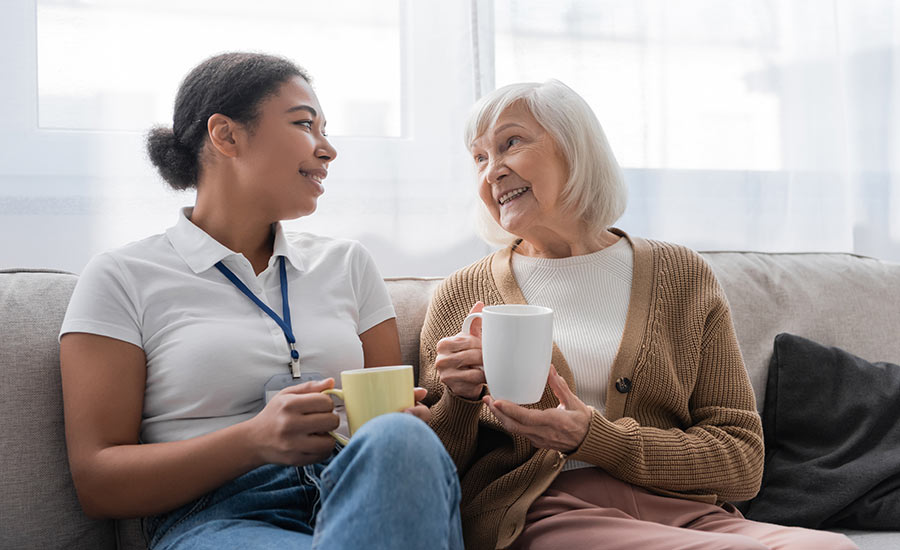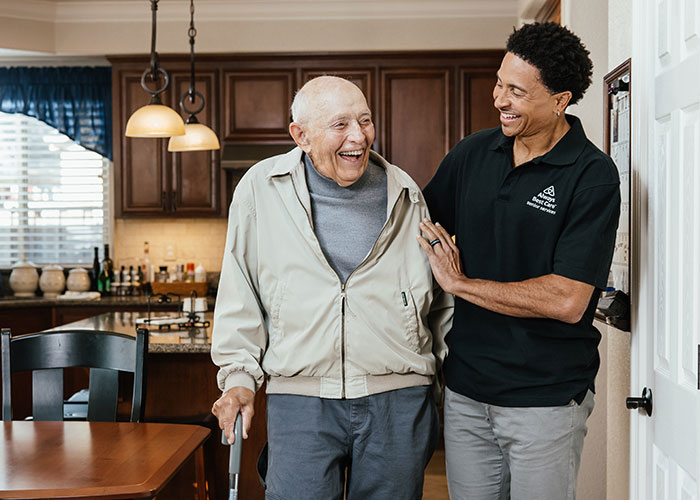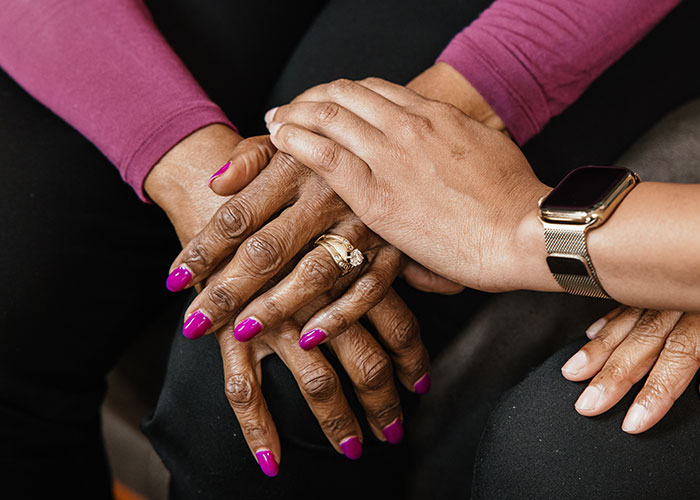A Guide to Live-In Care [Definition, Benefits & Preparation]
![A Guide to Live-In Care [Definition, Benefits & Preparation]](https://cdn.alwaysbestcare.com/wp-content/uploads/2024/07/live-in-care-hero-image.jpg)
Is your elderly loved one facing increasing difficulty with tasks they once found easy, such as climbing stairs?
If so, it might be time to consider a live-in caregiver.
A live-in caregiver can help make sure that meals are prepared, and personal needs are met, making a significant difference in their daily life.
We’ll cover everything you need to know about live-in care, including key benefits, tips to prepare your loved one for this kind of care, and how our in-home senior care can help.
Table of Contents
What Is Live-In Care?
Live-in care, or in-home senior care, is a type of support that provides around-the-clock assistance and companionship in the comfort of an elderly individual’s home.
This type of care allows elderly individuals or patients with disabilities, such as those with vision impairments, to maintain their independence and quality of life through personalized care tailored to their needs.
A fully trained caregiver usually offers this kind of support.
Live-In Care vs. 24-Hour Care at Home
Live-in care differs significantly from 24-hour care at home.
Live-in care involves one caregiver who resides in the home of an elderly individual. The caregiver has their own designated living space and sleeps there at night but can assist whenever their client — the elderly individual — needs help.
On the other hand, 24-hour care at home involves multiple caregivers working in shifts to provide continuous assistance and supervision.
This ensures the caregiver is always awake and available to meet the needs of the elderly individual.
Caregivers don’t need to have their own sleeping arrangements within the home, as they do not need to stay overnight.

What Services Does Live-In Care Offer?
A live-in caregiver provides various services through their agency.
Common live-in care services include:
- Personal care for your loved one, such as assistance with bathing, grooming, and toileting
- Companionship
- Running errands, such as grocery shopping or personal shopping
- Meal preparations and tidying up
- Light household chores, such as washing the dishes, doing the laundry, and changing linens
- Prescription pick-up refills
- Medication reminders
- Transportation to medical appointments or social events
- Mobility assistance to prevent falls
Key Benefits of Live-In Care
Most individuals prefer to stay in their homes as they age, making in-home senior care a lifeline for maintaining their independence and comfort.
Here are the top benefits your elderly loved one can gain from live-in care:
The Opportunity to Stay at Home
Most elderly individuals prefer to remain in their own homes, surrounded by familiar possessions. This is especially true for those with dementia, who may find changes distressing.
Live-in care allows them to stay in a familiar place, close to family members and friends.
Customized Care Plans
Each care plan is personalized to meet the specific health needs, preferences, and goals of your elderly loved one.
This ensures they receive the most appropriate and effective care for their age and medical needs.
Assistance with Diet and Meal Planning
According to AARP, also formerly known as the American Association of Retired Persons, meal planning can become difficult as an individual ages.
This is because our taste buds change as we grow older.
With the help of live-in caregivers, your elderly loved one can gain valuable support in meal preparation. This ensures that your elderly loved one’s nutritional needs and taste preferences are met.
Companionship
A 2023 study found that one in three adults aged 50 to 80 reported feeling isolated and lacking companionship.
With live-in care, your elderly loved one can feel less lonely, thanks to the companionship and ongoing social interaction a caregiver can provide.
Caregivers can also help elderly individuals continue to engage in their favorite hobbies and activities, which is important for their mental and emotional health.
Support with Medical Routines
Live-in caregivers can help with medication management, appointments, and other medical routines. This ensures that your elderly loved one’s health care needs are consistently met.
For example, caregivers can coordinate daily medication schedules, remind seniors of upcoming doctor’s visits, and assist with transportation to and from healthcare facilities.
Mobility Assistance
Live-in caregivers can also help with supporting your elderly loved one in moving around their home safely, which is essential for those with physical limitations or individuals prone to falls.

How to Prepare Your Elderly Loved One for In-Home Senior Care
While welcoming a caregiver into your loved one’s home can be a big adjustment, there are some steps you can take to create a welcoming and inclusive environment for everyone involved:
- Begin with having an honest conversation with your elderly loved one about the need for in-home senior care. Explain how it will work and the benefits it offers, such as around-the-clock companionship. For example, you can tell your elderly loved one the following line, “While I may not always be around to keep an eye on you, having a caregiver in your home will ensure you’re safe.”
- Involve your loved one in choosing their caregiver by reviewing profiles or participating in interviews. This inclusion in the selection process can offer them a sense of independence and eases the anxiety that comes with welcoming a new person into their home.
- Prepare a comfortable and private space for the caregiver, as caring 24/7 can be physically and emotionally demanding. This can help caregivers have a personal space where they can relax and unwind, away from their caregiving duties. At the end of the day, everyone needs some time alone, no matter how well they get along with those they care for.
- Collaborate with your elderly loved one’s caregiver to develop a daily routine that aligns with your loved one’s lifestyle and preferences. This can include meal scheduled and preferred activities. Establishing a routine can help reduce feelings of uncertainty and build trust between your elderly loved one and their caregiver.
- Organize all necessary medical information, such as medication schedules, doctor’s contacts, and any special dietary needs. This can help your elderly loved one’s caregiver recognize symptoms, manage emergencies, and administer medications accurately. Also, share your loved one’s likes and dislikes to help the caregiver provide comprehensive and compassionate care.
- Slowly introduce monitoring systems or medical alert devices to your elderly loved one. Demonstrate how they work and how these systems can contribute to their safety and well-being. For example, you can show how a wearable device can easily call for help in case of emergencies.
- Set up a system for regular check-ins with both your loved one and the caregiver. This can be done through daily calls, weekly visits, or video chats. Doing so can help you monitor their well-being and make sure the caregiver is meeting their needs effectively.
- Encourage your loved one to maintain social contacts and continue pursuing hobbies that fit their care schedule. For example, if your elderly loved one enjoys gardening, arrange brief sessions or provide tools that can help the caregiver assist your loved one in gardening safely and comfortably.
Find Reliable In-Home Senior Care at Always Best Care
If you or a loved one are considering care options but prefer not to move into a residential home or assisted living community, in-home senior care or live-in care might be the answer.
This care option involves a dedicated caregiver who lives in the home full-time, helping with both care needs and light housekeeping tasks.
For over 25 years, our dedicated team has provided trusted senior care across the United States and Canada.
With a network of more than 250 territories, we offer exceptional support and care to families.
Our services include:
- In-home care: Available 24/7, we can help with meal preparation, laundry, companionship, and personal care tasks, such as bathing, grooming, and dressing.
- Skilled home health care services: In select areas, we create tailored care plans for chronic conditions like diabetes and manage ongoing medical needs. Our caregivers are thoroughly vetted and trained to offer comprehensive care.
- Specialized home care services: We facilitate daily social interactions and provide health care guidance right in the comfort of your loved one’s home. We use advanced technologies, including personal emergency response systems, balance tracking systems, and remote patient monitoring to manage symptoms effectively.
- Respite care services: We offer flexible support ranging from short breaks to extended care periods, giving you a well-deserved break from caregiving duties.
- Dementia care services: We provide compassionate and safe care for individuals with dementia, prioritizing their comfort and well-being.
- Senior living referral services: We can help you find the ideal senior living community for your loved one, tailored to their needs and preferences.
- Veterans assistance program: We help veterans obtain financial aid for care as a way to thank them for their years of service.
At Always Best Care, our in-home senior care is all about meeting your loved one’s unique needs.
It’s our goal to help seniors stay independent and enjoy a better quality of life in the familiar corners of their home.
Whether your elderly loved one needs a hand with day-to-day tasks, managing medications, or just someone to chat with, our compassionate caregivers are here to make each day a little easier for them.





